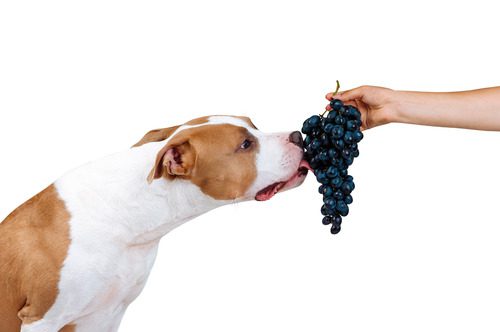Why Dogs Can’t Eat Grapes and Steps to Take If They Ate It
Grapes may seem like an innocent snack to have around the house, but for dogs, they can pose a life-threatening danger. Whether they snag a grape off your plate or find a few raisins in a dropped snack, even small amounts can lead to serious health concerns. Many pet owners are surprised to learn just how toxic grapes can be for their furry family members. If your dog has eaten grapes, contact one of our Emergency Veterinary Care Center locations for expert guidance and care tailored to your pet’s situation.

Why Are Grapes Toxic to Dogs?
Grapes and their dried counterparts, such as raisins, have long been recognized as harmful to dogs, but the exact reason for their toxicity remains a mystery. Researchers suspect that a substance in grapes triggers kidney failure in dogs, but no single compound has been conclusively identified.
Even small amounts of grapes can cause severe reactions. Toxicity levels vary from dog to dog, meaning some may experience symptoms after ingesting just one grape, while others may need to consume more to see adverse effects. Factors like breed, size, and overall health can influence the severity of the reaction.
Symptoms of Grape Toxicity in Dogs
If a dog consumes grapes, symptoms may appear within a few hours or take up to several days. Early signs of toxicity include:
- Vomiting and diarrhea
- Loss of appetite
- Lethargy or weakness
- Abdominal pain
- Dehydration (e.g., dry gums, excessive panting)
In severe cases, dogs may experience reduced urination or complete kidney failure, leading to life-threatening complications. Immediate action is critical if your dog shows any of these symptoms.
What Happens When a Dog Eats Grapes?
When a dog eats grapes, their kidneys are the primary organs affected. Acute kidney failure occurs when the kidneys lose their ability to filter toxins from the bloodstream, leading to a dangerous buildup of waste products. Without treatment, this condition can quickly escalate, putting a dog’s life in danger. The process of kidney failure includes:
- Toxin Absorption: After ingestion, the harmful substance in grapes begins to affect kidney function.
- Dehydration: As the kidneys fail, the dog’s body struggles to maintain proper hydration levels.
- Toxin Accumulation: Waste products accumulate in the bloodstream, causing further systemic damage.
- Organ Shutdown: If left untreated, kidney failure can result in the shutdown of other vital organs.
Steps to Take If Your Dog Ate Grapes
If you suspect or know your dog has eaten grapes, act immediately. Time is critical when it comes to preventing severe complications.
Remove Access to Grapes
Ensure your dog can no longer reach the grapes or raisins. Clear the area and check if any pieces remain accessible.
Identify the Quantity Consumed
Try to estimate how many grapes your dog has eaten. This information will help your veterinarian assess the potential risk and recommend the best course of action.
Contact Your Veterinarian or Emergency Vet
Call Emergency Veterinary Care Centers right away. Our highly trained team can guide you through the next steps and provide emergency care if needed. Delaying treatment increases the risk of severe kidney damage.
Avoid At-Home Remedies
Do not attempt to induce vomiting or administer medications without veterinary guidance. Incorrect methods can cause more harm than good. Your veterinarian will know the safest and most effective treatment plan.
Follow Veterinary Instructions
Your vet may ask you to bring your dog in for an examination. Be prepared to provide details about your dog’s health history, size, and the approximate time of ingestion. Tests such as bloodwork and urinalysis may be performed to assess kidney function.
Effective Treatment for Grape Toxicity in Dogs
Treatment for grape toxicity focuses on preventing further absorption of toxins and supporting kidney function. Your veterinarian will determine the best approach based on the amount of grapes consumed and the severity of your dog’s symptoms.
Decontamination
If caught early, your veterinarian may induce vomiting to remove the grapes from your dog’s stomach. Activated charcoal might also be administered to prevent toxin absorption.
IV Fluid Therapy
Intravenous (IV) fluids are a cornerstone of treatment, as they help flush toxins from the bloodstream and support kidney function. Fluids also combat dehydration, a common consequence of kidney failure.
Monitoring and Supportive Care
Your dog may require hospitalization for close monitoring. Vets will observe kidney function, electrolyte levels, and hydration status. Additional treatments, such as medications to protect the stomach lining or manage nausea, may also be provided.
How to Prevent Grape Toxicity in Dogs
Prevention is the best way to protect your dog from grape toxicity. By taking proactive measures, you can significantly reduce the risk of accidental ingestion.
- Store Grapes Safely: Keep grapes and raisins out of reach, including countertops, tables, and pantry shelves. Store them in secure containers that your dog cannot access.
- Educate Family Members: Ensure everyone in your household, including children, understands the dangers of feeding grapes to dogs. Share this information with guests who may bring grape-based snacks into your home.
- Monitor During Meals: Dogs are quick to grab dropped food. Be mindful of grapes that may fall to the floor during meal preparation or snack time.
Recognizing Hidden Sources of Grapes
Grapes and raisins can be found in more than just fresh fruit bowls. Many baked goods, trail mixes, and cereals contain these toxic ingredients. Always check the labels of foods your dog might accidentally access, especially during holidays and gatherings. If your dog has consumed grapes, don’t wait for symptoms to appear—contact Emergency Veterinary Care Centers immediately. Our experienced team is ready to provide the care your pet needs. Call one of our locations to ensure your dog gets the help they deserve.
Recent Posts
About Us
At Emergency Veterinary Care Centers (EVCC), we know that pet emergencies are unpredictable and often stressful. That's why our team, with over 20 years of emergency and critical care experience, is ready to assist you and your pet in the toughest situations.


